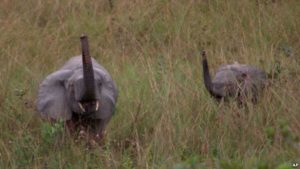
Speaking in Gabon at the start of a conference on the African Growth and Opportunities Act (AGOA), U.S. Trade Representative Michael Froman said the 12-nation Trans-Pacific Partnership would include measures to curb demand from Asia for trafficked wildlife from Africa.
Froman said the United States would also work within the framework of AGOA, renewed for 10 years in June, on measures supporting African nations to reduce the supply of poached animals to international markets.
AGOA allows tariff-free access for some 6,000 goods from 39 African nations to U.S. markets.
“The Trans-Pacific Partnership will help combat illegal wildlife trafficking, including the illegal trade of ivory from Africa,” Froman told the opening session of the two-day conference.
Gabon, a small, oil-exporting nation in central Africa, has chalked up notable successes in conservation, creating a number of national parks. Following heavy poaching of forest elephants elsewhere in the region, Gabon is home to 70 percent of the world’s remaining population.
Froman told Reuters he was confident that a deal on the Trans-Pacific Partnership — a cornerstone of President Barack Obama’s foreign policy pivot toward Asia — would be concluded soon, though a number of issues remained unresolved, including the opening of dairy markets.
Experts estimate Africa’s elephant population has fallen by more than 60 percent over the past decade. More than 30,000 elephants are killed every year in Africa, many of them to meet demand for ivory from Asian nations.
Michael Fay, an adviser on conservation to Gabon’s government, said that forest elephant populations had been hunted almost to extinction in neighboring Central African Republic, Chad and Cameroon.
“Gabon is almost like a beacon in the middle of all those countries that have lost hundreds of thousands of elephants over the last 25 years,” he told Reuters during a visit with Froman to the Wonga Wongue Presidential Reserve, where elephant numbers are rising.
Read more at voanews.com


